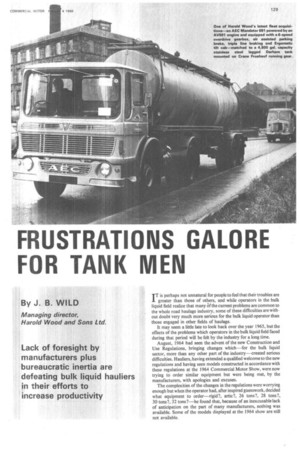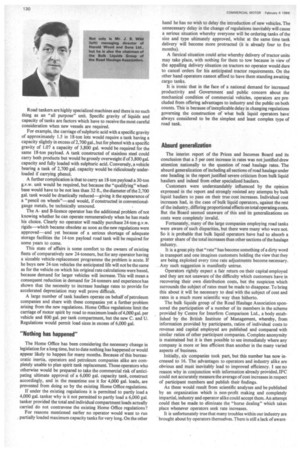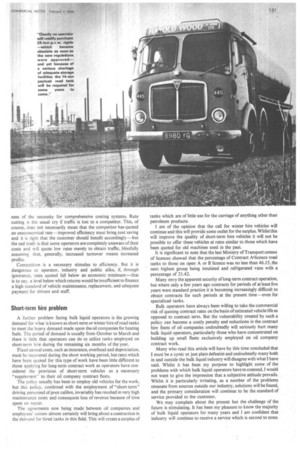FRUSTRATIONS GALORE FOR TANK MEN
Page 131

Page 132

Page 133

If you've noticed an error in this article please click here to report it so we can fix it.
By J. B WILD
Managing director, Harold Wood and Sons Ltd.
Lack of foresight by manufacturers plus bureaucratic inertia are defeating bulk liquid hauliers in their efforts to increase productivity
IT is perhaps not unnatural for people to feel that their troubles are greater than those of others, and while operators in the bulk liquid field realize that many of the current problems are common to the whole road haulage industry, some of these difficulties are without doubt very much more serious for the bulk liquid operator than those engaged in other fields of haulage.
It may seem a little late to look back over the year 1965, but the effects of the problems which operators in the bulk liquid field faced during that period will be felt by the industry for a long time.
August, 1964 had seen the advent of the new Construction and Use Regulations, bringing changes which—for the bulk liquid sector, more than any other part of the industry—created serious difficulties. Hauliers, having extended a qualified welcome to the new regulations and having seen models constructed in accordance with these regulations at the 1964 Commercial Motor Show, were now trying to order similar equipment but were being met, by the manufacturers, with apologies and excuses.
The complexities of the changes in the regulations were worrying enough but when the operator had, after inspired guesswork, decided what equipment to order—rigid?, artic?, 26 tons?, 28 tons?, 30 tons?, 32 tons ?—he found that, because of an inexcusable lack of anticipation on the part of' many manufacturers, nothing was available. Some of the models displayed at the 1964 show are still not available. Road tankers are highly specialized machines and there is no such thing as an "all purpose" unit. Specific gravity of liquids and capacity of tanks are factors which have to receive the most careful consideration when new vessels are required.
For example, the carriage of sulphuric acid with a specific gravity of approximately 1.5 in 18-ton lots would require a tank having a capacity slightly in excess of 2,700 gal., but for phenol with a specific gravity of 1.07 a capacity of 3,800 gal. would be required for the same 18-ton payload. A tank constructed of stainless steel could carry both products but would be grossly overweight if of 3,800 gal. capacity and fully loaded with sulphuric acid. Conversely, a vehicle bearing a tank of 2,700 gal. capacity would be ridiculously underloaded if carrying phenol.
A further complication is that to carry an 18-ton payload a 30-ton g.v.w. unit would be required, but because the "qualifying" wheelbase would have to be not less than 32 ft., the diameter of the 2,700 gal. tank would be drastically reduced—giving it the appearance of a "pencil on wheels"—and would, if constructed in conventionalgauge metals, be technically unsound.
The Aand B-licence operator has the additional problem of not knowing whether he can operate remuneratively when he has made his choice. Clearly no operator will readily purchase 24-ton-g.v.w. rigids—which became obsolete as soon as the new regulations were approved—and yet because of a serious shortage of adequate storage facilities the 14-ton payload road tank will be required for some years to come.
This state of affairs is some comfort to the owners of existing fleets of comparatively new 24-tonners, but for any operator having a sizeable vehicle-replacement programme the problem is acute. If he buys new 24-ton vehicles the anticipated life will not be the same as for the vehicle on which his original rate calculations were based, because demand for larger vehicles will increase. This will mean a consequent reduction in demand for 24-tonners and experience has shown that the necessity to increase haulage rates to provide for accelerated depreciation may well prove difficult A large number of tank hauliers operate on behalf of petroleum companies and share with these companies yet a further problem arising from the new regulations. Home Office regulations limit the carriage of motor spirit by road to maximum loads of 4,000 gal, per vehicle and 800 gal. per tank compartment, but the new C. and U. Regulations would permit load sizes in excess of 6,000 gal.
"Nothing has happened" The Home Office has been considering the necessary change in legislation for a long time, but to date nothing has happened or would appear likely to happen for many months. Because of this bureaucratic inertia, operators and petroleum companies alike are completely unable to plan spirit tank replacement. Those operators who otherwise would be prepared to take the commercial risk of anticipating ultimate approval of a 6,000 gal. capacity tank, construct accordingly, and in the meantime use it for 4,000 gal. loads, are prevented from doing so by the existing Home Office regulations.
If under the existing regulations it is permitted to partly load a 4,000 gal. tanker why is it not permitted to partly load a 6,000 gal. tanker provided the total and individual compartment loads actually carried do not contravene the existing Home Office regulations?
For reasons mentioned earlier no operator would want to run . partially loaded maximum capacity tanks for very long. On the other hand he has no wish to delay the introduction of new vehicles. The unnecessary delay in the change of regulations inevitably will cause a serious situation whereby everyone will be ordering tanks of the size and type ultimately approved, whilst at the same time tank delivery will become more protracted (it is already four to five months).
A farcical situation could arise whereby delivery of tractor units may take place, with nothing for them to tow because in view of the appalling delivery situation on tractors no operator would dare to cancel orders for his anticipated tractor requirements. On the other hand operators cannot afford to have them standing awaiting cargo tanks.
It is ironic that in the face of a national demand for increased productivity and Government and public concern about the mechanical condition of commercial vehicles, operators are precluded from offering advantages to industry and the public on both counts. This is because of inexplicable delay in changing regulations governing the construction of what bulk liquid operators have always considered to be the simplest and least complex type of road tank.
Absurd generalization The interim report of the Prices and Incomes Board and its conclusion that a 5 per cent increase in rates was not justified drew attention nationally to the question of road haulage rates. The absurd generalization of including all sections of road haulage under one heading in the report justified severe criticism from bulk liquid hauliers and indeed from other specialized hauliers.
Customers were understandably influenced by the opinion expressed in the report and strongly resisted any attempts by bulk liquid hauliers to pass on their true cost increases. Individual cost increases had, in the case of bulk liquid operators, against the rest of the industry, differing proportional effects on total operating costs. But the Board seemed unaware of this and its generalizations on costs were completely invalid.
Fortunately, many of the large companies employing road tanks were aware of such disparities, but there were many who were not. So it is probable that bulk liquid operators have had to absorb a greater share of the total increases than other sections of the haulage industry.
It is a great pity that "rate" has become something of a dirty word in transport and one imagines customers holding the view that they are being exploited every time rate adjustments become necessary. Any such suggestion is manifestly untrue.
Operators rightly expect a fair return on their capital employed and they are not unaware of the difficulty which customers have in recovering their own distribution costs, but the suspicion which surrounds the subject of rates must be made to disappear. To bring this about it will be necessary to deal with the subject of cost and rates in a much more scientific way than hitherto.
The bulk liquids group of the Road Haulage Association sponsored the participation of a number of its members in the scheme provided by Centre for Interfirm Comparison Ltd., a body established by the British Institute of Management, whereby, from information provided by participants, ratios of individual costs to revenue and capital employed are published and compared with similar ratios of other participant companies. Complete anonymity is maintained but it is then possible to see immediately where any company is more or less efficient than another in the many varied aspects of business.
Initially, six companies took part, but this number has now increased to 16. The advantages to operators and industry alike are obvious and must inevitably lead to improved efficiency. I see no reason why in conjunction with information already provided, IFC could not accurately measure the average of cost increases in respect of participant members and publish their findings.
As these would result from scientific analyses and be published by an organization which is non-profit making and completely impartial, industry and operator alike could accept them. An attempt could then be made to eliminate the "horse dealing" which takes place whenever operators seek rate increases.
It is unfortunately true that many troubles within our industry are brought about by operators themselves. There is still a lack of aware ness of the necessity for comprehensive costing systems. Rate cutting is the usual cry if traffic is lost to a competitor. This, of course, does not necessarily mean that the competitor has quoted an uneconomical rate—improved efficiency must bring cost saving and it is right that the customer should benefit accordingly—but the sad truth is that some operators are completely unaware of their costs and will quote low rates merely to obtain traffic, blissfully assuming that, generally, increased turnover means increased profits.
Competition is a necessary stimulus to efficiency. But it is dangerous to operator, industry and public alike, if, through ignorance, rates quoted fall below an economic minimum—that is to say. a level below which returns would be insufficient to finance a high standard of vehicle maintenance, replacement, and adequate payment for drivers and staff.
Short-term hire problem
A further problem facing bulk liquid operators is the growing demand for what is known as short-term or winter hire of road tanks to meet the heavy demand made upon the oil companies for heating fuels. The period of demand is usually from October to March and there is little that operators can do to utilize tanks employed on short-term hire during the remaining six months of the year.
Fixed annual costs, such as insurance, overhead and depreciation, must be recovered during the short working period, but rates which have been quoted for this type of work have been little different to those applying for long-term contract work as operators have considered the provision of short-term vehicles as a necessary "supplement" to their oil company contract fleets.
The policy usually has been to employ old vehicles for the work, but this policy, combined with the employment of "short-term" driving personnel of poor calibre, invariably has resulted in very high maintenance costs and consequent loss of revenue because of time spent on repair.
The agreements now being made between oil companies and employees' unions almost certainly will bring about a contraction in the demand for hired tanks in this field. This will create a surplus of tanks which are of little use for the carriage of anything other than petroleum products.
I am of the opinion that the call for winter hire vehicles will continue and this will provide some outlet for the surplus. Whilst this will improve the quality of short-term hire vehicles it will not be possible to offer these vehicles at rates similar to those which have been quoted for old machines used in the past.
It is significant to note that the last Ministry of Transport census of licences showed that the percentage of Contract A-licence road tanks to those on open A or B licence was no less than 46.15, the next highest group being insulated and refrigerated vans with a percentage of 21.42.
Many envy the apparent security of long-term contract operation, but where only a few years ago contracts for periods of at least five years were standard practice it is becoming increasingly difficult to obtain contracts for such periods at the present time—even for specialized tanks.
Bulk operators have always been willing to take the commercial risk of quoting contract rates on the basis of estimated vehicle life as opposed to contract term. But the vulnerability created by such a policy can become a costly penalty and reductions in the contract hire fleets of oil companies undoubtedly will seriously hurt many bulk liquid operators, particularly those who have concentrated on building up small fleets exclusively employed on oil company contract work.
Many who read this article will have by this time concluded that I must be a cynic or just plain defeatist and undoubtedly many both in and outside the bulk liquid industry will disagree with what! have said. Whilst it has been my purpose to highlight some of the problems with which bulk liquid operators have to contend, I would not want to give the impression that a subjective attitude prevails. Whilst it is particularly irritating, as a number of the problems emanate from sources outside our industry, solutions will be found, and the primary consideration will continue to be the standard of service provided to the customer.
We may complain about the present but the challenge of the future is stimulating. It has been my pleasure to know the majority of bulk liquid operators for many years and I am confident that industry will continue to receive a service which is second to none.




































































































































































































